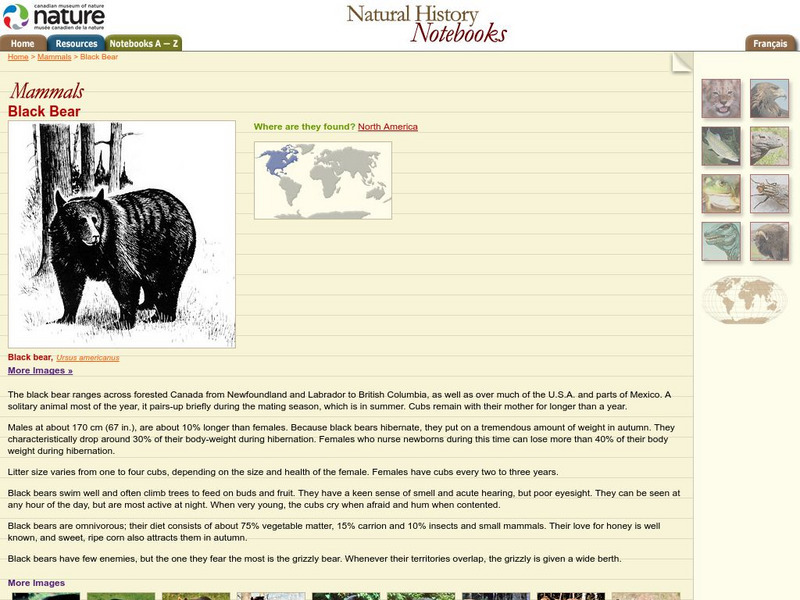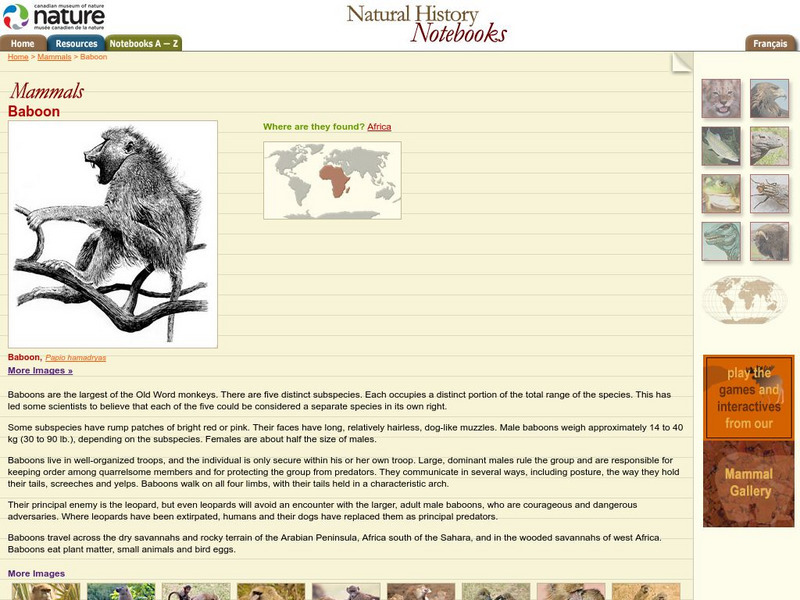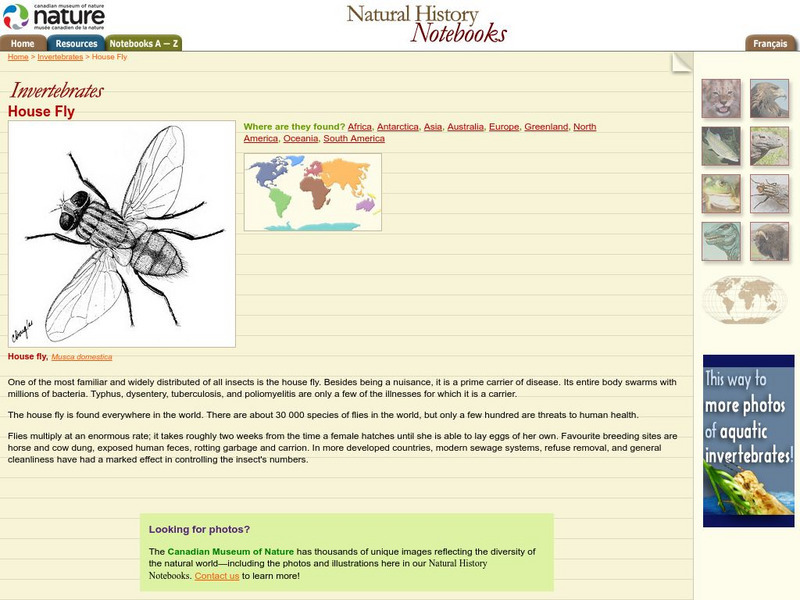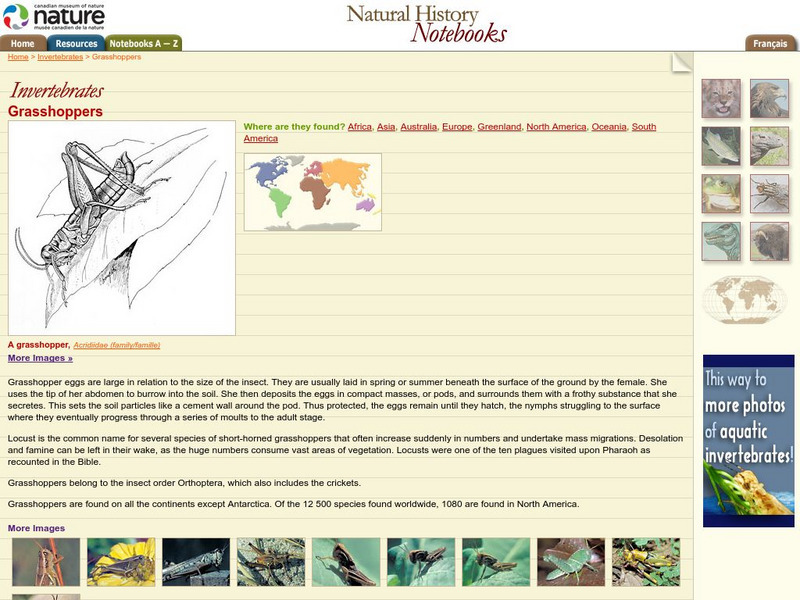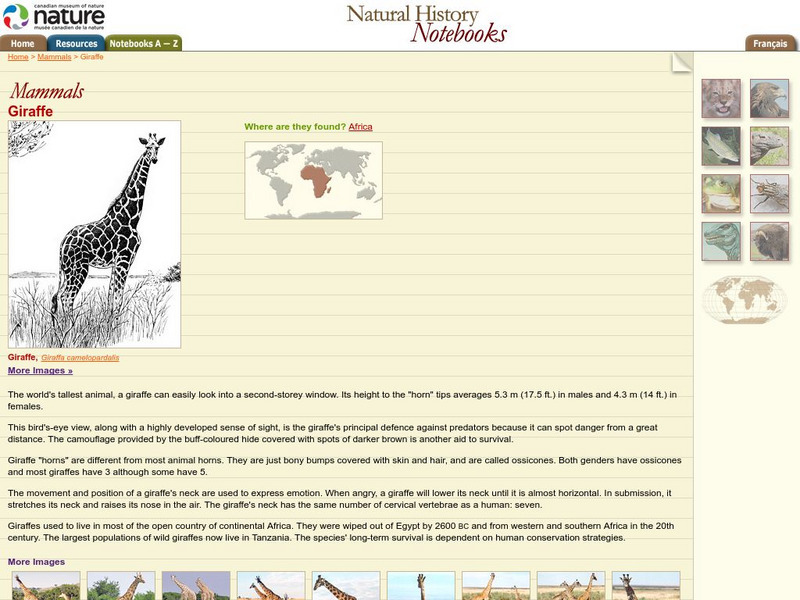Canadian Museum of Nature
Canadian Museum of Nature: Brown Trout
Find out about the Brown Trout in this concise but informative article.
Canadian Museum of Nature
Canadian Museum of Nature: Blue Shark
A brief description of the Blue Shark with numerous photographs.
Canadian Museum of Nature
Canadian Museum of Nature: Atlantic Salmon
Learn more about the Atlantic Salmon from this concise, informative site.
Canadian Museum of Nature
Canadian Museum of Nature: Black Footed Ferret
Most of the black-footed ferret population in North America has been eradicated due to human activities and campaigns to remove prairie dogs from agricultural areas. A few protected colonies have survived in the United States. Some facts...
Canadian Museum of Nature
Canadian Museum of Nature: Black Bear
Facts about the black bear's behavior, diet and habitat can be found here, along with quite a few pictures.
Canadian Museum of Nature
Canadian Museum of Nature: American Bison
American bison used to number in the many millions and are now confined to small protected areas. Some facts about these magnificent creatures and photos are available here.
Canadian Museum of Nature
Canadian Museum of Nature: Big Brown Bat
The big brown bat, which is not all that big, has survived well alongside humans. Facts and pictures about these hardy creatures can be found here.
Canadian Museum of Nature
Canadian Museum of Nature: North American Beaver
The North American beaver has survived despite centuries of trapping for their valued pelts. Beavers are marvelous engineers who, the author says, are 'second only to humans in the magnitude of change which they can effect on their...
Canadian Museum of Nature
Canadian Museum of Nature: Baboon
The baboon is native to Africa. They have structured societies with dominant males as leaders. Some facts about the baboon and pictures are found here.
Canadian Museum of Nature
Canadian Museum of Nature: Asian Lion
The Asian lion is an endangered animal with only two populations surviving today. Information about this creature and photos can be found on this animal facts page.
Canadian Museum of Nature
Canadian Museum of Nature: Asian Elephant
The Asian elephant has a long history of being used by humans and is now endangered. Information about this creature and photos can be found on this animal facts page.
Canadian Museum of Nature
Canadian Museum of Nature: Arctic Wolf
The Arctic wolf is native to the Canadian Arctic. Information and pictures are found on this animal facts page.
Canadian Museum of Nature
Canadian Museum of Nature: American Mink
Learn about the behavior and habits of the American mink. A set of pictures accompanies this animal facts page.
Canadian Museum of Nature
Canadian Museum of Nature: American Badger
Learn about the behavior and habits of the American badger. A set of pictures accompanies this animal facts page.
Canadian Museum of Nature
Canadian Museum of Nature: African Wild Dog
The survival of the African wild dog is fragile as it is easily affected by human intrusion on its habitat. Facts and pictures are found on this animal facts page.
Canadian Museum of Nature
Canadian Museum of Nature: Lion
Lions of today mainly live in protected areas as their survival is threatened. Facts and pictures are found on this animal facts page.
Canadian Museum of Nature
Canadian Museum of Nature: African Elephant
You will find information here about the African elephant and how it differs from the Asian elephant. There is also a nice set of pictures.
Canadian Museum of Nature
Canadian Museum of Nature: Octopuses
The octopus is a fascinating creature that is found all over the world. Its ability to change the skin's appearance, for example, helps it to communicate with other octopuses as well as to camouflage itself. More interesting facts and...
Canadian Museum of Nature
Canadian Museum of Nature: Monarch
The Monarch butterfly is widely studied by students when they learn about insect life cycles. Basic information about the Monarch and threats to its survival are described here. There are also pictures showing the Monarch in various...
Canadian Museum of Nature
Canadian Museum of Nature: House Fly
The house fly is found all over the world and is well known for its ability to carry communicable diseases such as dysentery and typhus. Some facts about them can be read here.
Canadian Museum of Nature
Canadian Museum of Nature: Grasshoppers
Grasshoppers are found all over the world. Some basic facts about these insects are found here along with some pictures.
Canadian Museum of Nature
Canadian Museum of Nature: Sea Worms
Several species of sea worms are described here - the peanut worm, the priapulid worm and the spoon worm - all of which are found in Canadian waters.
Canadian Museum of Nature
Canadian Museum of Nature: Ants
Ants have long fascinated people for the hierarchical nature of their colonies, which in many ways resemble human social structures. They are also known for their intelligence. Some facts and pictures are found here.
Canadian Museum of Nature
Canadian Museum of Nature: Giraffe
Information about the giraffe's physical features and behavior is found here, along with some photos. The largest concentration of giraffes lives in Tanzania today.






